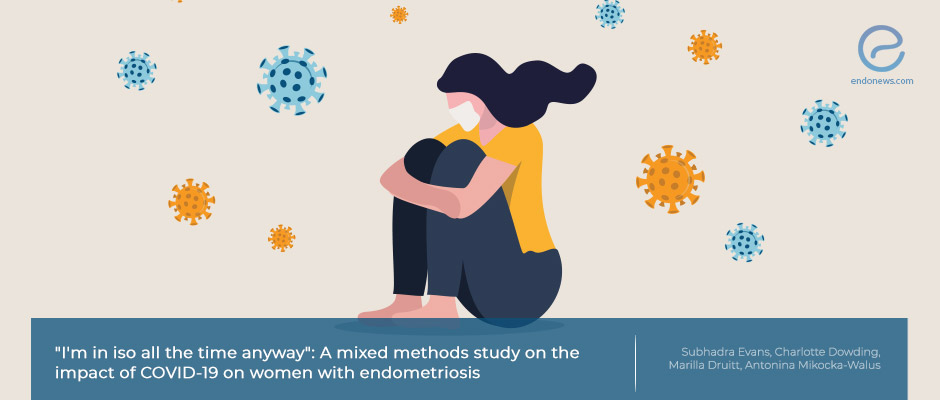The effect of COVID-19 pandemic on patients with endometriosis
Jun 25, 2021
How has COVID-19 changed the lives of endometriosis patients?
Key Points
Highlights:
- COVID-19 caused difficulties in reaching the professional health system and delays in the diagnosis and treatment of endometriosis.
- Also, difficulty in accessing health care could be the reason for the deterioration of mental health and life quality.
Importance:
- The present study aimed to clarify the effect of COVID-19 and COVID-19 fear on endometriosis patients’ access to a professional healthcare system, functioning, and life quality in Australia.
What's done here:
- Patients with dysmenorrhea and endometriosis requested to participate in a previous study via e-mail in 2019, invited to participate in the present study.
- Demographic parameters including resident state, age, marital status, ethnicity, employment, and parous status were recorded at baseline and 12-month follow-up.
- Additionally, three open-ended questions were asked:
- “What impact, if any, does COVID-19 have on your access to healthcare?”
- “What impact, if any, does COVID-19 have on your symptoms?”
- “How does COVID-19 impact your daily functioning?’’
- A single-item Numerical Rating Scale (NRS) from 0 (no pain) to 10 (worst pain), was used to assess menstrual pain severity. Also, A self-report questionnaire was used for pandemic fear. The total scores being ranged from 7 to 35, and the higher score is associated with more fear.
Key Results:
- A total of 162 patients with a mean age of 30.8 years were enrolled in the study ,and 40 participants (25.0%) had a full-time job.
- Sixty percent (98/162) patients stated that the COVID-19 pandemic and related conditions negatively impacted their healthcare.
- Almost a quarter of participants (35 patients) emphasized that COVID-19 deteriorate their daily activities; however, most patients experienced deterioration in their daily functioning.
- Logistic regression analysis revealed that fear of COVID-19 had a significantly negative impact on healthcare, symptoms, and daily functioning.
- Additionally, women’s daily activities in Victoria (which exhibited serious lockdowns during the pandemic)were significantly more impacted by COVID-19 than women living in other Australian states.
Limitations:
- A relatively small patients’ number of study could be considered as a limitation.
- The participants’ responses could be affected by mental health, fatigue, and physical environmental conditions rather than endometriosis itself.
- Also, the authors focused on only a short period of COVID-19, if the duration of COVID-19 prolongs, endometriosis patients’ thoughts could change.
Lay Summary
COVID-19 pandemic and related conditions, including transport restrictions, social isolation, and difficulties accessing the professional health system, affected many women’s healthcare and daily routine.
Evans and colleagues investigated the impact of COVID-19 and COVID-19 related parameters on endometriosis patients’ health situation and their daily functioning.
Patients who participated in a previous study via e-mail in 2019, invited to participate in the present study, and the study link was sent via email for the 12-month survey in June 2020.
The authors evaluated participants’ demographic parameters and thoughts about the COVID-19 pandemic. The results revealed that 98 (60%) patients stated that the COVID-19 pandemic negatively impacted their healthcare, and 35 patients (22%) emphasized that COVID-19 deteriorate their daily activities.
Logistic regression analysis revealed that fear of COVID-19 was a predictive factor for deterioration of healthcare, symptoms, and daily functioning in women with endometriosis.
The authors suggested that even Australia lived COVID 19 pandemic in a more liberated manner compared to the rest of the world. Any increase in restrictions such as in Victoria City overwhelmed women and amplified their fear while decreasing life quality.
This interesting article was published in a recent issue of scientific journal named "Journal of Psychosomatic Research".
Research Source: https://pubmed.ncbi.nlm.nih.gov/33993063/
covid19 endometriosis life quality

